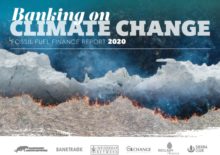The latest version of the most comprehensive report on global banks’ fossil fuel financing, Banking on Climate Change 2020, was released yesterday, revealing that 35 global banks have not only been sustaining but expanding the fossil fuel sector with more than $2.7 trillion in the four years since the Paris Climate Agreement. The report finds that financial support for the fossil fuel industry has increased every year since the Paris Agreement was adopted in December 2015. The UN Intergovernmental Panel on Climate Change (IPCC) Special Report Global Warming of 1.5°C has shown that we need to rapidly reduce global carbon emissions if we are to avert the worst consequences of the climate crises. Yet Banking on Climate Change 2020 reveals that the business practices of the world’s major private-sector banks continue to drive us toward climate disaster.
Banking on Climate Change 2020, released by Rainforest Action Network, BankTrack, Indigenous Environmental Network, Oil Change International, Reclaim Finance, and the Sierra Club, and endorsed by over 250 organizations from 45 countries around the world, adds up lending and underwriting to 2,100 companies across the coal, oil and gas sectors globally over the period 2016-2019.
The report finds that fossil fuel financing continues to be dominated by the big U.S. banks: JPMorgan Chase, Wells Fargo, Citi, and Bank of America. Together, these four banks account for a staggering 30% of all fossil fuel financing from the 35 major global banks since the Paris Agreement was adopted.
JPMorgan Chase has provided $269 billion — over a quarter of a trillion dollars — in fossil financing since the Paris Agreement. That figure not only places JPMorgan Chase as the #1 fossil fuel bank in the world but shows that Chase exceeds second place Wells Fargo by a 36% margin. JPMorgan Chase’s $269 billion also represents nearly 10% of the total fossil financing from all 35 banks studied in the report. Furthermore, JPMorgan Chase is the most aggressive funder in some of the most dangerous and harmful categories over the last four years — leading in fossil fuel expansion, Arctic oil and gas, offshore oil and gas, and fracking.
RBC has been banking fossil fuels at $141 billion over the same period. This makes RBC the worst fossil banker in Canada, leading other Canadian banks by more than a third. In Europe Barclays is cited as the worst, outpacing other European banks by a 36% margin. Barclays poured $118 billion into fossil fuels from 2016-2019 — though BNP Paribas was Europe’s biggest fossil fuel funder in 2019. Moreover, BNP Paribas has been the worst fossil bank in France in the four years since the Paris Agreement, by a 56% margin.
MUFG, the worst banker of fossil fuels in Japan, provided $119 billion in fossil fuel financing during this period. China’s worst fossil fuel bank, Bank of China, funneled $84 billion to the fossil fuel sector overall and was a major funder of coal in particular.
The report also tracks bank funding for fossil fuel expansion by aggregating bank financing for 100 companies aggressively planning new coal, oil, and gas extraction and related infrastructure. Of the $2.7 trillion in fossil fuel finance, $975 billion went to these companies. Despite the urgent need to immediately halt all fossil fuel expansion, financing for these top 100 expanders skyrocketed 40% from 2018 to 2019.
In addition to tracking these banks’ fossil fuel financing practices, Banking on Climate Change 2020 also scores banks’ future-facing policies on fossil fuels. The report assesses these institutions on their restrictions on financing for fossil fuel expansion and their commitments to phase-out fossil fuel financing in order to prevent global temperatures from exceeding a 1.5°C increase. However, no major banks are even close to meeting these goals, despite several recent, high profile policy announcements from financial institutions.
The report also assesses bank policies and practices around financing certain key fossil fuel subsectors. There has been an overall decline in financing for coal mining and power, where bank policies restricting financing have been in place for the longest period of time. But coal financing must fall much more steeply in order to be phased out in this decade.
In the tar sands sector, bank financing has fallen since 2017, though 2019 levels remain higher than 2016. Many European banks have implemented policies to restrict financing for the tar sands sector, but the biggest bankers of tar sands — including Canadian banks TD and RBC as well as JPMorgan Chase and Barclays — have failed to take any meaningful action.
Over the past four years, big banks have also increased their funding to companies with significant Arctic oil and gas reserves. Financing for fracked oil and gas also increased year on year, with U.S. banks topping the list as the worst funders of the sector. All banks profiled, with the exception of UniCredit and RBS, continued to allow unrestricted financing for companies producing and expanding oil and gas offshore. In addition, financing for top companies building liquefied natural gas import and export terminals jumped 39% last year.
Banking on Climate Change 2020 also highlights the banks’ unacceptably poor performance on human rights via their financing of particular case study projects — from the Indigenous-led opposition of the Line 3 pipeline in North America, to fracking in Argentina’s Vaca Muerta basin, to a proposed coal mine expansion in Poland. These examples highlight the lack of effective human rights policies to prevent these institutions from financing highly problematic projects and the problematic companies behind them.






